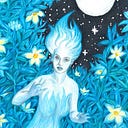Interesting that you identify the main "lodestar" of metaphysical self-exploration as "dissatisfaction". But is this necessarily the only useful question from which to begin your understanding of reality?
Why should the lodestar not be the wondrous mystery of being alive at all? Why is it only the feeling of "why is something wrong" that matters? Why not the question of "why is there anything at all?" "What is this "being""? "What is this life?" "What is this self that can be awake and aware of its own existence?" And in that question contains within it all the questions about "why do I feel pain" and also "why do I feel joy and beauty and wonder" etc.
To me that boils down to the question "what is the nature of consciousness". Or rather, "what is the nature of MY consciousness" since it must be understood from the first person perspective. Because within that question is the question "what is life" and "what is existence".
Having read several of your articles by now I'm starting to think that what you define and think of as "mysticism" is not actually what I think of as mysticism. Because the way I understand mysticism, it's the experiential realisation of the true nature of consciousness and the interconnectedness of everything. (Or rather the fact that all "things" and their associated names, separate concepts etc are constructs of our left brain which ruthlessly cuts up and segments everything in order to understand it as much as it can).
Whereas when you talk about mysticism (and feel free to disabuse me if I'm wrong) it seems that you think of mysticism as some ineffable feeling of joy and transcendence and love. You even talk about reification using different words here as "people confusing the abstract conceptualisation of an entity with the entities these abstractions are meant to be representative of". Which is great - I agree with you here, but you then say this is an "almost mystical self delusion". You also refer to reification again as "a mystical self-narcosis". Which indicates to me that again, your definition of mysticism is very different from mine.
I believe you don't really understand what mysticism is. It's not reification. It's actually the very thing you're calling for in this article. The subjective experience of "the real thing" beyond the concepts and abstractions caused by our left brain.
This is what mysticism is commonly understood to be. Not a wishy washy "love feeling" or "abstraction".
https://en.wikipedia.org/wiki/Scholarly_approaches_to_mysticism#Mystical_experience
You say "we are only interested in pursuing objective metaphysical knowledge - knowledge independent of conceptualisation and ideology". But don't you see? The tools of "objective knowledge" are themselves still concepts. Logic and reason require you to use concepts in order to wield them.
I agree with you, that which the word "truth" refers to, is "independent of conceptualisation". That means that to gain more understanding of it, beyond our concepts, we have to go into the direct experience itself. I have found altered states of consciousness to be extremely useful for this. It's not that sober-consciousness is bad, or that logic is bad, or that we shouldn't use objective knowledge to try and understand reality, but that objectivity alone is always going to be incomplete, being as it is inevitably tied to the veil of concepts, words and numbers.
Keep using objectivity for sure. But why not use all the tools available to you instead of just one? Why not unlock parts of your brain that ordinary consciousness doesn't access? Why not access the wisdom of the right brain? Why not experience mysticism (by which I mean the experience of reality beyond concepts), and then use that in concert with your objective understanding of science and logic?
